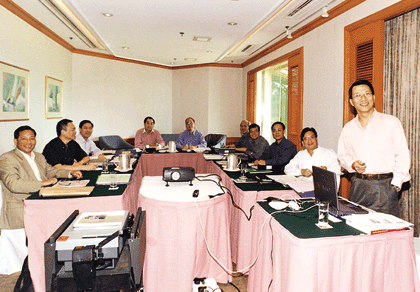|
EPP plans for 2002-03
In devising EPP initiatives for 2002-03, we remain vigilant in observing
the following guiding principles -
| ¡E |
Quality of public service will not be compromised.
We must ensure that the various performance pledges made in the
Controlling Officer's Report on fire suppression, protection and
emergency ambulance service will continue to be met. |
| ¡E |
No staff redundancy should arise as a result of the
implementation of EPP. As disciplined grades of FSD are not included
in the Voluntary Retirement Scheme, the extent to which surplus
posts can be deleted is subject to the ceiling of natural wastage
and number of additional new posts during the EPP years. |
| ¡E |
All echelons and service fronts should participate and contribute
towards Department's EPP target. All streams of disciplined grades,
including officers and other ranks, civilian and technical grades
will have a fair share of contributions in this productivity enhancement
exercise.
|
|
|
Strategies employed for devising EPP plans for
2002-03
The savings package and resources revamping effort since 1989 have reduced
the scope in redeployment of resources. After introducing the various
EPP initiatives in 2000-01 and 2001-02, there are indeed not many spending
areas for further reduction. The Department is in need of new strategies
and approach in exploring new sources of productivity gains. Multi-pronged
strategies were adopted in the third round of productivity enhancement.
The Department has taken a vigorous review on the level of expenditure
and use of human resources on all fronts of services, both 'horizontally'
and 'vertically'. The 'horizontal' approach is to examine areas that
have not been previously exposed to EPP scrutiny. The 'vertical' effort
is to re-visit those units and services which have been subject previously
to EPP with a view to further enhancing their productivity. In both
approaches, there have been thorough examinations of job duties at all
levels for re-allocation of resources.
We find it extremely useful to learn from other departments and public
bodies on how to improve efficiency. Experience sharing in EPP forums,
tips from EPP Ambassadors and articles in EPP newsletters have provided
us with valuable insight and innovation in coming up with EPP plans.
Staff and staff associations are encouraged to contribute suggestions
that are well taken into consideration in developing EPP plans.
One noteworthy area of expenditure is our over $100 million worth Service
Level Agreement with the EMSTF. Reviewing the best value-for-money on
their maintenance service has been one of our major targets for EPP
savings. We have been in discussion with the EMSTF to negotiate a competitive
price for the maintenance service. Our needs are fully appreciated by
EMSTF. They in turn strive for entering a longer duration of service
agreement with FSD that would allow them scope for better planning and
the ability to provide the service at a more competitive price. The
negotiation is still on-going and we aim at achieving a win-win situation.
- Process
Developing EPP plans is a two-way process between management and staff
in FSD. Strategies and share of EPP contributions are deliberated
by Senior Directorate. Staff suggestions are channeled to the Headquarters.
Based on these deliberations, Chief Fire Officer (Headquarters) and
the Department's Finance Controller generates various options. Departmental
Secretary and his EO colleagues advise on the financial and staffing
implications, including impact on intake of new recruit, staff wastage,
effect on promotion and staff morale issues.
-
- Recently, FSD held for the first time an off-site Senior Commanders'
Forum on a weekend in June which was attended by Director, Deputy
Director, seven Senior Commanders and Departmental Secretary. The
objective is to keep Senior Commanders abreast of and for them to
exchange views on latest development of departmental policy issues,
major tasks in hand and service improvement initiatives for the next
twelve months. EPP plans for 2002-03 were discussed and Senior Commanders
gave their views on the implications on the provision of service in
their respective commands.
-
- The next important step is to roll out the EPP proposals to the
staff side and consult them. This will be led by the Deputy Director
who would meet all staff associations in the Department through established
channels like the Departmental Consultative Committees. He will also
hold meetings with individual associations explaining to them the
EPP plans and collect their feedback.
-
EPP spirit
The Department is pleased to note that the EPP plans for 2002-03 are
progressively taking shape. We are proud that we can meet the EPP target
of reducing the recurrent operating expenditure by 5% by 2002-03, despite
that this productivity drive has been achieved through painstaking efforts
and stretching our lean resources to the utmost limits. Apart from delivering
productivity gains, the most important achievement of FSD in this exercise
is that we have inculcated a culture of taking challenges, a EPP spirit
among all managers and service members, and a constant search for ways
to achieve greater results from available resources. This mind set change
is vital in enabling the Department to continue striving for the best
value-for-money in Government expenditure and making sustainable improvement
in its services.
Fire Services Department
June 2001
|


